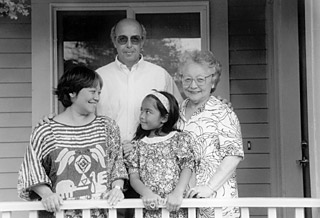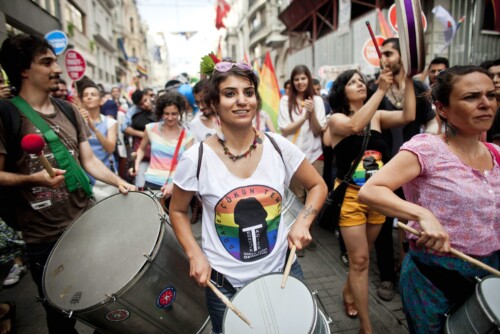Our Bodies, Ourselves, Our Families
I wrote the previous sentence as a new mother, at a time when I felt particularly vulnerable and strong; and thinking, as I always do when I enter a new life stage, about my sister. What does she think of the new baby? What does she think of being an aunt? What questions has my daughter’s birth raised for her about children and family, about her life and mine, in the same way it has for me?
I do not know the answers to those questions. But I do know that whatever path she takes, my sister deserves to have her choices affirmed by our society, by the individuals in her own extended family, and the programs we have collectively set in place. I also believe that as feminists, we have a responsibility to listen to, include, and follow the lead of disabled women—those like my sister, and those different from her—when we debate and work on issues related to the family. There is too much we share, and too much at stake for all of us, not to do otherwise.
Works Cited
Asch, Adrienne and Michelle Fine. “Nurturance, Sexuality and Women with Disabilities: The Example of Women and Literature.” In The Disability Studies Reader, edited by Lennard J. Davis. New York and London: Routledge, 1997.
Douglas, Susan J., and Meredith W. Michaels. The Mommy Myth: The Idealization of Motherhood and How It Has Undermined Women. New York: Free Press, 2004.
Garland-Thomson, Rosemarie. “Integrating Disability, Transforming Feminist Theory.” NWSA Journal 14.3 (2002): 1–32.
Hillyer, Barbara. Feminism and Disability. Norman: University of Oklahoma Press, 1993.
Hubbard, Ruth. “Abortion and Disability: Who Should and Who Should Not Inhabit the World?” In The Disability Studies Reader, edited by Lennard J. Davis. New York and London: Routledge, 1997.
Kittay, Eva Feder. Love’s Labor: Essays on Women, Equality, and Dependency. New York and London: Routledge, 1999.
———. “When Caring Is Just and Justice Is Caring: Justice and Mental Retardation.” In The Subject of Care: Feminist Perspectives on Dependency, edited by Eva Feder Kittay and Ellen K. Feder. Lanham, MD: Rowman and Littlefield, 2002.
McRuer, Robert. “As Good as It Gets: Queer Theory and Critical Disability.” GLQ: A Journal of Gay and Lesbian Studies 9.1–2 (2003): 79–105.
Olivas, Luana. “Helping Them Rest in Peace: Confronting the Hidden Crisis Facing Aging Parents of Disabled Children.” The Elder Law Journal 10.2 (2002): 393–424.
Samuels, Ellen. “Critical Divides: Judith Butler’s Body Theory and the Question of Disability.” NWSA Journal 14.3 (2002): 58–76.
Sandahl, Carrie. “Queering the Crip or Cripping the Queer? Intersections of Queer and Crip Identities in Solo Autobiographical Performance.” GLQ: A Journal of Gay and Lesbian Studies 9.1–2 (2003): 25–56.
Seltzer, Marsha M. and Krauss, Marty W. “Adult Sibling Relationships of Persons with Mental Retardation.” In The Effects of Mental Retardation, Disability, and Illness on Sibling Relationships: Research Issues and Challenges, edited by Zolinda Stoneman and Phyllis Berman. Baltimore: Paul H. Brookes, 1993.
Wendell, Susan. “Toward a Feminist Theory of Disability.” In The Disability Studies Reader, edited by Lennard J. Davis. New York and London: Routledge, 1997.
Wilkerson, Abby. “Disability, Sex Radicalism, and Political Agency.” NWSA Journal 14.3 (2002): 33–57.



